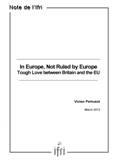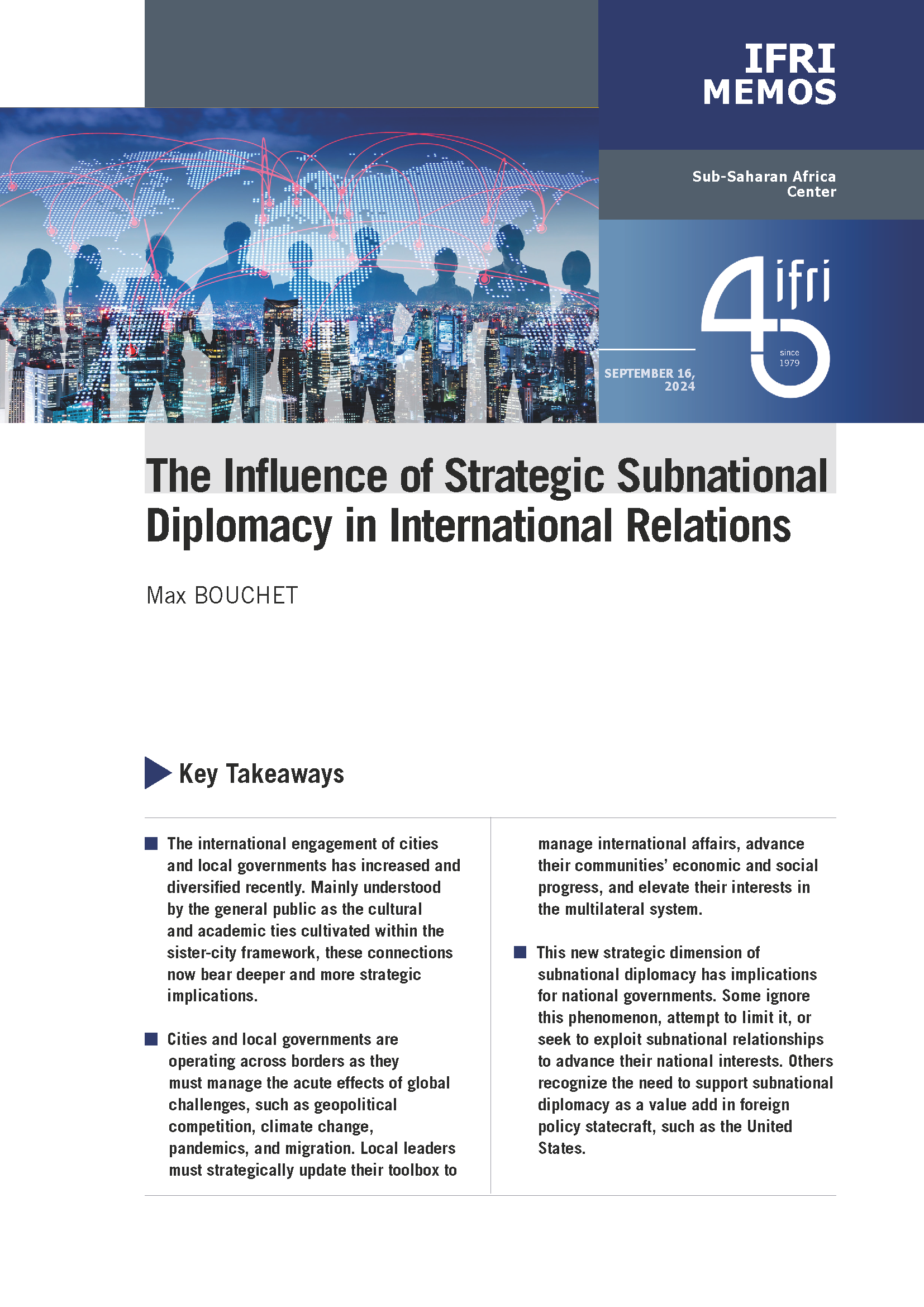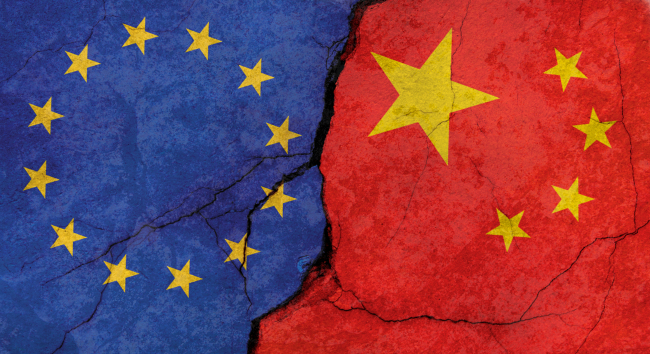In Europe, not Ruled by Europe: Tough Love between Britain and the EU

Discussions of a potential “Brexit”, the United Kingdom leaving the European Union, have sparked debate in Britain, and also across Europe, intensified by the UK veto of the “fiscal compact” at the European Council in December 2011. What sounded like the absurd pipedream of a few hard-core eurosceptics a couple of years ago has now become a genuine possibility.
This study argues that this state of affairs does not originate from a deliberate strategy by the UK or its European partners. Rather they have set themselves on diverging paths, one leading to more integration, the other at best to the status quo - actually a form of relative disintegration - or to less integration. The more the gap widens, the less improbable a “Brexit” appears.
Time is ticking, one might say now that David Cameron has announced that he was in favour of a referendum framed as the choice between staying in the EU on renegotiated terms and leaving. Aside from the need for the Conservatives to win the general election in 2015 and the uncertainty this leaves hanging over the British economy, many other factors may influence how the situation plays out.
This study explores three scenarios: Britain remaining a full member, Britain becoming an associate member, and Britain leaving the EU. The first scenario could occur after a successful referendum to stay but this study predicts that this outcome is only likely if the terms of membership have been revised, or if no referendum takes place. The latter is a possibility if the Labour party wins the election - it has not committed to calling a referendum although it might still do so - or if the Conservatives decide to call it off, if negotiations to revamp the membership have not yet delivered for instance. However, it is very unlikely that member states will offer much leeway to the UK, especially if its demands appear disproportionate, for instance a complete withdrawal from social and employment policy.
The second scenario requires a fundamental change within the EU. The Union has not been designed for differentiation among its members. All developments have been intended to encompass all countries; some have simply chosen not to go along. If this change of conception happened, then an associate membership would be a real option. It would have to be neither too appealing nor too appalling for all parties. That is why it is difficult to imagine an associate membership based on the Single Market, unless the UK decides to set aside its differences on regulation, which is unlikely. It would be a hard sell today, but could become more acceptable if for instance the associate membership status excluded the Single Market and included all other policies. The UK would lose its global advantage as “a gateway to Europe” - a significant toll for its economy - as well as access to EU"s network of trade agreements, but it could limit the damage by fostering a robust trade deal with the EU and would be free from a large chunk of EU regulation. This path would likely be unattractive for other potentially interested countries, as it would represent a gamble for any economy which is not as well positioned globally as the UK is. This scenario could occur if the government calls a referendum with one of the options being an associate membership, both if the other option is to leave or to remain a full member.
The last scenario is a possible but undesirable outcome. Without some renegotiations and if the Single Market loses its appeal in the UK, an in/out referendum could lead to a “Brexit”.
This study devotes significant attention to the domestic scene and actors. Domestic considerations have been the main drivers of this debate, dominated by actors resisting “more Europe”. This study identifies three main categories of actors: political opponents to the EU; pragmatic eurosceptics challenging the virtue of further integration; and pragmatic reformers who want to implement change in coalition with other member states rather than unilaterally. In other words, pro-integration supporters have lost all influence in the UK.
The strongest common bond for those who do not wish to exit the EU is the Single Market. This study argues that as long as it remains valuable in the eyes of politicians and business leaders, the UK will not seek its future outside the EU. But that may not be enough. The European economies are expected to remain sluggish over the next few years and the UK, like others, is seeking to diversify its export base. Moreover, it has grasped probably quicker than some others the tectonic shift in the global economic balance of power. Its leadership in services - a substantial part of the UK"s economy - is increasingly challenged by emerging players and the competition will become tougher. The triple weight of regulation - national, European, and global - could affect how non-EU investors value doing business in the UK as well as how British firms balance the importance of the Single Market and opportunities within fast growing economies, especially when resources to battle on both fronts are limited. In that respect, British firms often look at Germany to find that balance. This study argues that the capacity for the British government to convince its European counterparts to embrace its preferred reforms on regulation, competitiveness, the Single Market, and trade, will reflect on how the EU is perceived within the UK. All other arguments to promote EU membership hold considerably less sway in the domestic debate.
The UK discussions are interesting for the future of the EU, because more integration might not remain the accepted pathway. Dissatisfaction against the EU is growing and it might translate into growing euroscepticism as well as political reluctance to encourage more integration. Debate in the UK could act as the incubator which spreads such ideas to other parts of the Union.

Also available in:
Regions and themes
ISBN / ISSN
Share
Download the full analysis
This page contains only a summary of our work. If you would like to have access to all the information from our research on the subject, you can download the full version in PDF format.
In Europe, not Ruled by Europe: Tough Love between Britain and the EU
Related centers and programs
Discover our other research centers and programsFind out more
Discover all our analyses
Getting China Onboard a Global Debt Governance System
China has become the number one provider of development finance in the world. Because of its significant share in Low and Middle Income Countries’ (LMICs) external debt, China should take up responsibilities and cooperate with traditional development finance providers, but its particular lending style and distinct approach to debt management pose many challenges and do not make international cooperation straightforward.
Deployment of the French Frigate Bretagne in the Indo-Pacific: Implementing French Strategy in the Region
The deployment of the French Navy’s multi-mission frigate (FREMM) Bretagne in the Indo-Pacific in recent months demonstrates France’s capability to project power far from the mainland and solidifies its Indo-Pacific strategy.
Japan’s Enhanced Security Engagement With the Pacific Islands
The expansion of security and defense cooperation stands as the most spectacular change in Japan’s contribution to the region in recent years.
National Perspectives on Europe's De-risking from China
The concept of “de-risking” has become a significant focus for the European Union (EU) in managing its relations with China since first proposed by European Commission President Ursula von der Leyen in March 2023. However, the interpretation and policy responses to de-risking vary across Europe, reflecting diverse national perspectives.











